Over the recent years, we have seen many businesses and organizations, both big and small, letting go of their outdated business phone systems and switching to VoIP solutions. Unparalleled cost-savings of 25% to 40%, increased reliability, excellent scalability, and advanced communication features beyond voice calling are some undeniable benefits of VoIP solutions over traditional phone lines. No wonder the VoIP services market is expected to reach US$ 354.7 Billion by 2032, according to Future Market Insights.
If you’re looking to choose a VoIP phone service provider for your business but are not sure which one to opt for (considering the abundance of choices available), you’ve landed on the right page. In this blog, we’ll break down the key factors you should consider when choosing a VoIP provider along with the list of top VoIP service providers to help you select just the right fit for your business communications.
Factors to Consider When Choosing a VoIP Service Provider
Here’s how to choose a VoIP provider to meet your specific business needs and requirements and what you should be taking into account when evaluating different VoIP providers:
Available features
Not all VoIP providers share the same amount of features and capabilities. Below we’ve listed the most critical ones that will help you handle your inbound and outbound customer communications efficiently. You might not necessarily need all of these VoIP features, but it will give you a better understanding of what you should be looking for when considering multiple VIP vendors.
Call routing
Call routing is one of the fundamental features of a VoIP phone system that is particularly critical for inbound call centers with high call volumes. By being able to set up specific call routing rules, you can ensure your incoming calls will be directed to the most appropriate departments or agent groups, reducing call transfers that might only frustrate callers. And what’s more, with advanced skill-based routing, you can connect callers to the agents with the most relevant skills, reducing your Average Handle Times.
IVR and Auto Attendant
Interactive Voice Response and Auto Attendant systems allow callers to interact with an automated phone menu through pre-recorded voice prompts (such as Press 1 for sales, Press 2 for tech support, etc.), helping you navigate them to the right department or agent. By capturing customer intent and additional information from callers before routing their call to the desired destination, these systems can improve your call routing strategy and save your reps time and effort. That means increased First Call Resolution (FCR) rates and improved Customer Satisfaction Scores (CSAT).
Call queueing
With call queuing, your VoIP system will automatically distribute inbound phone calls into corresponding call queues when your reps are not available to answer immediately. Along with call routing and IVR, that is a must-have feature for call centers handling high inbound call volumes. Some VoIP phone systems may also offer queue callbacks, which can help you dramatically reduce the number of abandoned calls. A quick fact: a study by Software Advice found that 63% of consumers would prefer a callback instead of waiting on hold.
Call recording
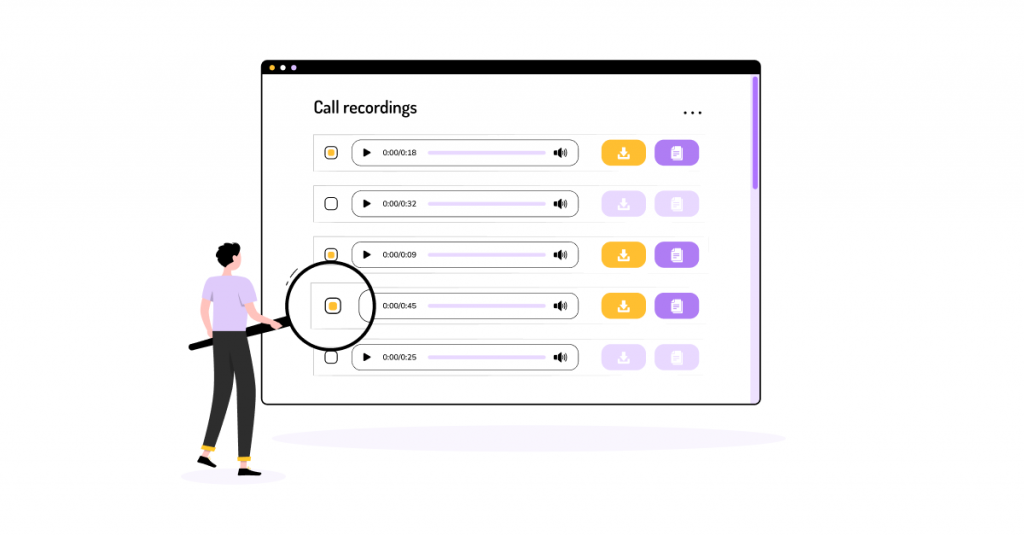
Call recording enables you to record your inbound or outbound calls automatically or on demand and store them for future reference. You may want to record calls for a variety of reasons like compliance, agent performance tracking, or agent training purposes. Businesses can also use call recording to resolve legal issues or disputes. Luckily, most VoIP systems offer call recording as part of a basic feature set.
Call monitoring
Call monitoring allows you to listen in on live calls in real time and hear first-hand how your reps are interacting with customers and prospects. Moreover, with call whispering, an advanced call monitoring feature, you can join in on active calls and provide on-call guidance to agents without the person on the other side hearing anything. That’s an excellent way to train and onboard newly hired agents and help them gain confidence when interacting with customers or prospects.
Call reporting and analytics
With reporting and analytics features of a VoIP business phone system, you can easily collect, track, and analyze your call metrics and performance KPIs, such as inbound and outbound call volumes, FCR (First Call Resolution) rates, Average Handle Times, call transfers, abandoned calls, or just about anything that matters to you. Based on this data, you can evaluate how reps are performing, spot improvement opportunities, and roll out changes that will improve your call center operations.
Auto dialing
Many VoIP service providers offer auto dialing solutions that can automate and optimize the entire process of making outbound calls, saving your reps tons of time and effort by eliminating the need to dial each number manually. If you run a sales-oriented outbound call center, you’d definitely want to opt for a VoIP provider with auto dialing capabilities (preferably even multiple dialing modes like power dialing and predictive dialing). Auto dialers can dramatically improve your team’s performance and the efficiency of your outbound calling campaigns.
Text messaging
Text messaging is another great feature available with top VoIP providers. It basically allows you to send and receive SMS messages using your VoIP phone numbers. That can help you streamline communications with your customers and prospects, simplify the post-call follow-up process, and ensure your messages get delivered to your recipients’ mobile devices almost instantly. Most importantly, you’ll be able to keep all records of call and text communications in one platform.
Video calling
Today’s capabilities of VoIP phone systems go beyond voice calling and texting. Many VoIP providers are now offering video calling and video conferencing tools, which became increasingly popular during the pandemic to enable more personalized communications with customers and remote team members. Video conferencing tools can also be great for sales and marketing purposes (e.g., product demos).
Omnichannel capabilities
Today’s consumers increasingly prefer to interact with brands through various digital channels in addition to voice calling. Some advanced VoIP solutions are now offering omnichannel capabilities, allowing businesses to unify multiple communication channels (including voice and digital ones) in a single platform. That means you can manage customer commutations via phone, email, social media, and instant messaging channels from one unified solution.
Reliability and uptime
Besides evaluating features, reliability and uptime are also incredibly important considerations. A trustworthy VoIP service provider will have a proven track record of guaranteed uptime of at least 99.9% and minimal service disruptions (reviews are a great way to find that out). To ensure the continuity of your business communications, you should take into account each provider’s infrastructure, disaster recovery capabilities, backup, and redundancy measures. Besides that, security, data protection measures, and compliance with regulations are critical factors to consider, too.
Scalability
At some point, your business will most likely grow, which brings us to the importance of the scalability of a VoIP phone system. With an easily scalable solution, you’ll be able to scale your operations up whenever needed to handle the increased call volumes. That means adding new numbers, users, or features and functionalities should be a quick and effortless process that won’t interrupt your operations and won’t require significant adjustments or investment from your side. That’s why when weighing your options, it’s always a good idea to discuss scalability with each VoIP provider to ensure you can seamlessly expand your call center operations as your business grows.
Integrations with third-parties
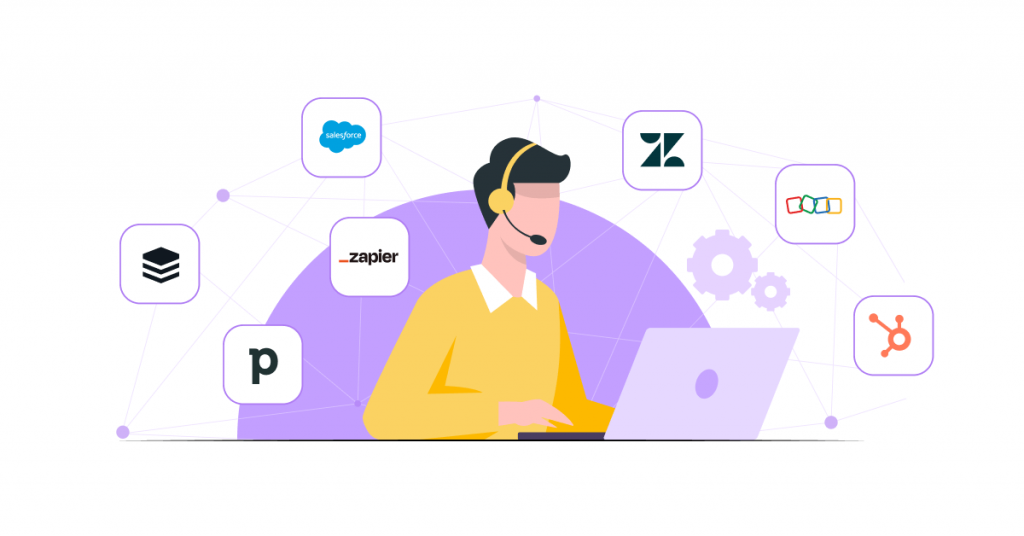
The provider’s ability to integrate with third-party systems, such as CRM tools, helpdesk software, and business productivity apps is probably just as important as the set of features it offers. Just think about how critical this is. When your business phone system can integrate with your CRM, all calls and call data will be automatically logged into your CRM system, eliminating the need for your agents to do it manually and constantly switch between the different tools. It helps automate repetitive tasks and improve your team’s productivity.
On top of that, when a customer calls in, their contact information and the history of previous interactions will be instantly retrieved from the CRM and displayed on the agent’s screen via screen pops, empowering them to deliver more contextual and personalized interactions and improving customer support experiences.
Flexibility and customization
Flexibility is yet another key factor that is worth your attention. Are you looking for a VoIP phone system to fit your specific business needs and requirements? Do you want to be able to leverage customizable call flows, advanced call routing options, and integration with your existing business systems? Look for VoIP service providers that offer highly customizable solutions that can accommodate your unique needs and integration options through APIs.
Security
Since VoIP service operates over the internet, technically, your data is susceptible to being stolen. Naturally, if you want your and your clients’ data to remain safe and completely secure, your VoIP provider should take care of that for you. That makes security a vital deciding factor. High-level encryption, advanced account management, multi-factor authentication, and multiple data centers are things that you can inquire about to be sure you’re selecting a credible vendor that takes security seriously.
Costs involved
Compare the pricing plans of different VoIP providers to ensure you are getting the best value for your money. Pay attention to all the costs involved. Firstly, you may have to pay a one-time installation fee or an account activation fee. Secondly, you’ll be charged per user on a month-to-month or an annual basis. Then there may be additional fees (e.g., for international calls, premium support, dedicated staff training, etc.). Finally, if you decide to upgrade to the next level sometime later, you should expect a higher price along with it.
Customer support
Last but definitely not least, the availability, responsiveness, and reliability of customer support offered by a VoIP service provider are extremely important to consider before making a final decision. In case something goes wrong, you want to make sure you’ll be able to instantly reach the vendor’s support representatives and get your issue taken care of right away professionally. Ideally, of course, you should be able to get customer support round-the-clock. That being said, here are a few questions you can clarify with each VoIP provider to evaluate the level of customer support you can expect from them.
- Is customer support available through multiple channels, and what are these channels?
- Is customer support provided 24/7 or only during standard business hours?
- How quickly are customer requests handled during holidays/ weekends?
- What’s the average response time for support requests?
- Are there premium support options, and what are the additional fees for that?
- Are there any self-help support options and resources available?
Top 5 Best VoIP Providers to Choose From
Now that you know what factors and features to consider when evaluating VoIP vendors, let’s briefly go through some of the top VoIP providers available on the market:
- VoiceSpin
- Nextiva
- RingCentral
- CallHippo
- DialPad
1. VoiceSpin
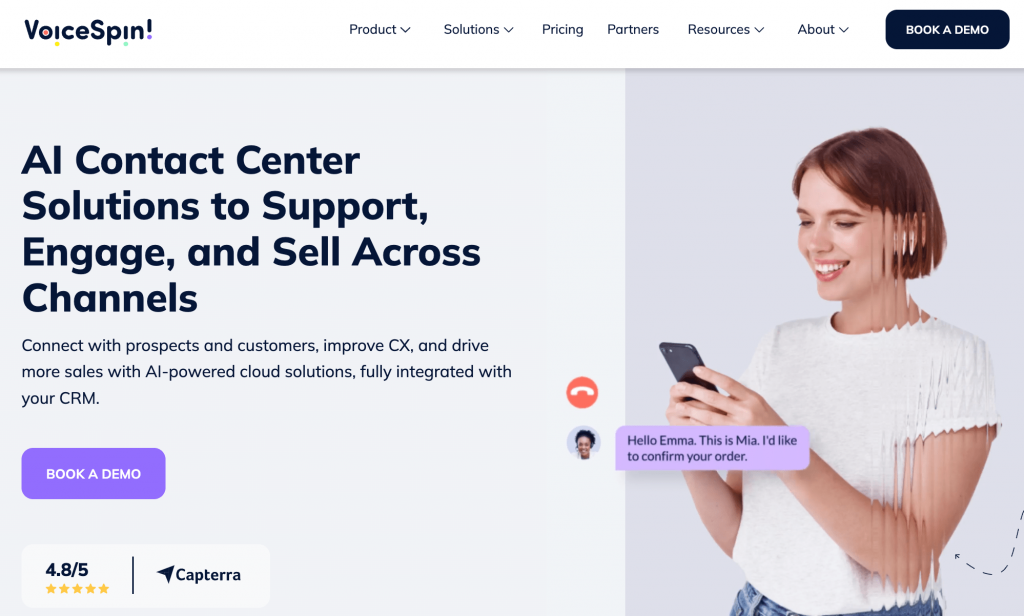
VoiceSpin is a cloud call center software provider that offers a VoIP business phone system to businesses of any size across multiple industries. With over 15+ years of experience in the industry and cloud infrastructure based on AWS, it’s one of the most reliable solutions on the market. VoiceSpin offers international DID numbers in 160+ countries at some of the most affordable rates.
In addition to both basic and advanced inbound call management features, it offers an AI auto dialer that supports different dialing modes, including power dialing and predictive dialing. What’s distinctive about VoiceSpin’s AI calling system is that it is able to score leads and agents and intelligently match leads to the best-suited agents based on the probability of making a successful sale, making it an ideal solution for sales teams in outbound call centers.
VoiceSpin offers out-of-the box and custom integration options with CRM systems and business apps. And in addition to calling, you can also leverage bulk SMS texting and omnichannel messaging solutions to engage with customers across digital channels, including live chat, social media, WhatsApp, Telegram, and other instant messaging apps. Overall, the solution can be customized to meet the very specific needs of your business, making it also one of the most flexible VoIP systems out there.
Features:
- Call routing and queueing
- Queue callback
- Multi-level IVR
- AI auto dialer with multiple dialing modes
- Local Caller ID
- Advanced reporting
- Speech analytics
- Bulk SMS texting
- Omnichannel messaging
Ideal business type: SMBs and large enterprises, best for sales-oriented teams
Pros:
- Guaranteed uptime and instant scalability
- Customization options and API developer support
- Highly responsive customer support that is available 24/7
Cons:
- Implementation may take longer if you want extensive customizations
- Requires a minimum of 5 agents to sign up
Pricing:
- Basic – $270 /month (billed annually), 5 users included
- Advanced – $472 /month (billed annually), 5 users included
- Enterprise – $900 /month (billed annually), 5 users included
2. Nextiva
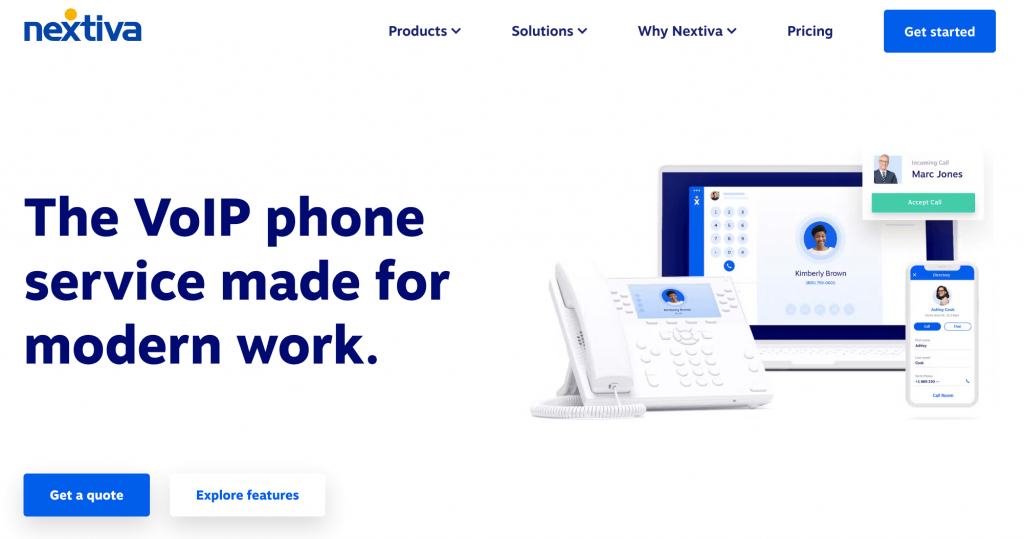
Nextiva is among the top-rated VoIP providers in the United States, offering both desktop and mobile apps, unlimited calling within the United States and Canada, and a free local and toll-free number. It offers a unified communication package with voice, video, and chat features. The platform can be used for efficient inbound call management with features like call routing, IVR, auto-attendant, call forwarding, customizable greetings, and voicemail, as well as an auto dialer for handling outbound calls.
A range of team communication and collaboration tools is what sets Nextiva apart from its major competitors. It offers video and audio conferencing tools such as one-on-one messaging for team members, multiple group chat rooms, and video meetings, making it a great tool for remote call center teams.
In addition, Nextiva provides advanced reporting tools and basic integration options with leading CRM systems and business apps, including Zoho, Salesforce, HubSpot, and Zendesk. Overall, its flexible offers can be tailored to meet different business needs.
Features:
- Unified communication with voice, video, and chat
- Unlimited video conferencing
- Multi-level auto attendant
- Voicemail transcription
- Team collaboration
- Real-time voice analytics
- Mobile and desktop SMS/MMS
- Auto dialer
- Omnichannel contact center capabilities
Ideal business type: small, medium, and large businesses
Pros:
- Easy to set up and use
- Unlimited calling within the United States and Canada
- Highly responsive customer support team
Cons:
- Less small business-friendly than competitors
- Offers rather limited integration options
Pricing:
- Essential Plan: $18.95/ user/ month
- Professional Plan: $22.95/ user/ month
- Enterprise Plan: $32.95/ user/ month
3. RingCentral
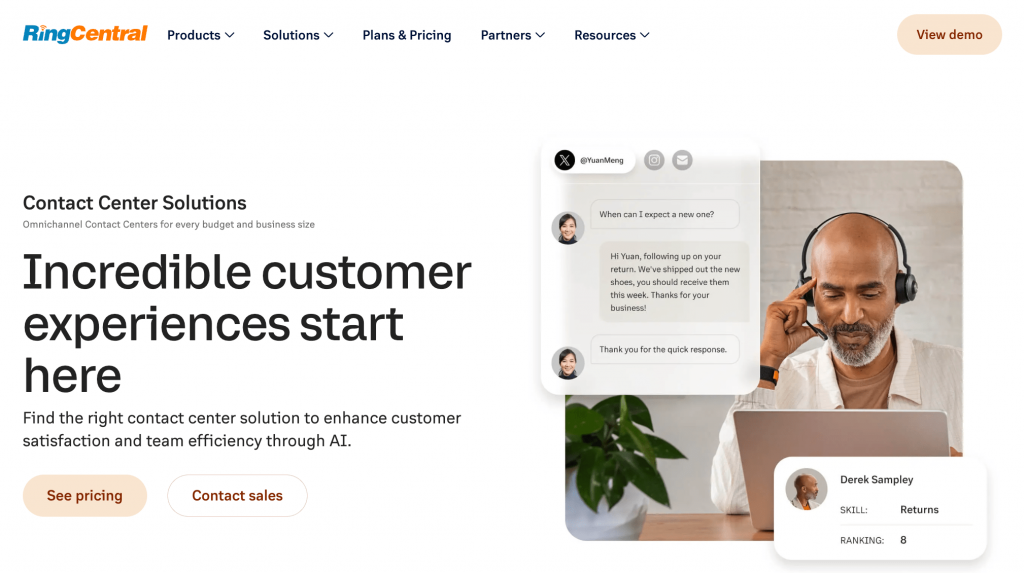
RingCentral is another popular VoIP phone system that offers unlimited domestic calling in the United States and Canada and local phone numbers in over 200 area codes to establish a local presence. The system has all the inbound call management features to handle incoming calls effectively. That includes call routing, IVR and auto attendant, call queueing, call forwarding, call screening, and call monitoring. It also supports auto dialing with multiple dialing modes for efficient outbound calling.
RingCentral is also known for having lots of team collaboration features, such as team messaging, file sharing, and audio and video conferencing. In addition, the system operates across desktop and smartphone devices and supports remote desktop control.
What sets RingCentral apart from many of its competitors is that it offers impressive integration options with third-party apps and services, making it one of the most integration-friendly VoIP platforms. In addition, it offers access to APIs, allowing you to customize the platform based on your specific needs.
Features:
- Call routing and queueing
- IVR and multi-level auto attendant
- SMS and MMS
- Call recording
- Visual voicemail
- Advanced call monitoring
- Real-time analytics
- Audio and video conferencing
- Remote desktop control
Ideal business type: small, medium businesses, and large businesses
Pros:
- Easy to set up, deploy, and operate
- Rich set of features and collaboration tools
- Extensive integrations with third-party apps
Cons:
- Users often report issues with a mobile app
- Customer support is largely AI-based, making it hard to reach a live agent
Pricing:
- Core Plan: $20/ user/ month
- Advanced Plan: $25/ user/ month
- Ultra Plan: $35/ user/ month
4. CallHippo

CallHippo, one of the well-known names in the industry, offers a VoIP service solution with local and toll-free numbers in over 50 countries and unlimited calling minutes within the United States and Canada. It enables you to handle inbound calls efficiently by offering a bunch of call-management features, including multi-level IVR, custom greetings, call cascading, multiple-level call transfer, call recording, advanced call monitoring, and more.
CallHippo also offers auto dialing solutions (power dialer and predictive dialer) to streamline your outbound calling. In addition to inbound and outbound calling, the platform provides business SMS text messaging, voice broadcasting, and WhatsApp API integration toolkit.
The platform can be integrated with a wide range of CRM systems (including Zoho, Pipedrive, HubSpot, and Salesforce), helpdesk systems, sales automation tools, and productivity apps, which can help you improve your team’s productivity.
Features:
- Multi-level IVR
- Call forwarding
- Call recording
- Voicemail
- Call monitoring
- Conference calling
- Auto dialer
- Reporting and analytics
- SMS text messaging
Ideal business type: SMBs, medium, and large enterprises
Pros:
- The system is easy to set up
- Extensive integrations with third-party tools
- Has a mobile app for Android and IOS
Cons:
- Occasional call quality issues
- Users report issues with customer support
Pricing:
- Starter Plan: $28/ user/ month
- Professional Plan: $56/ user/ month
- Ultimate Plan: $80/ user/ month
5. Dialpad
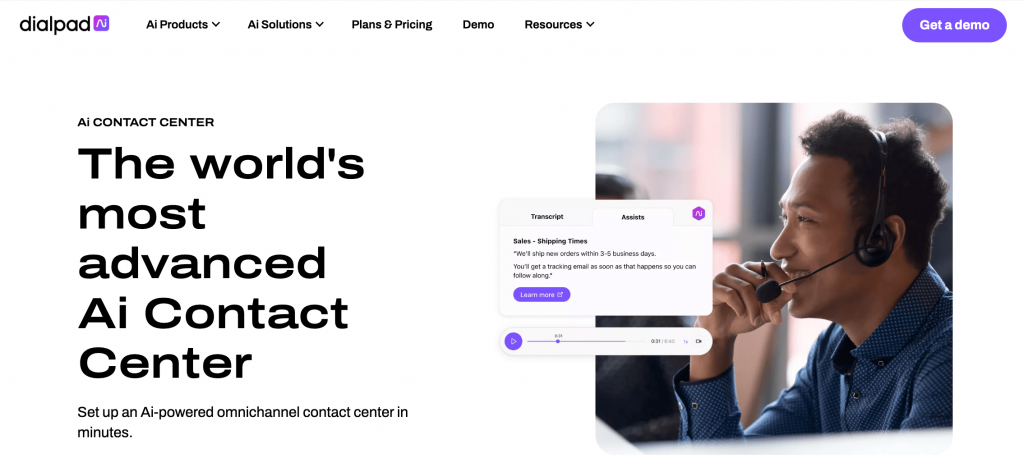
Dialpad is a popular VoIP phone system that offers unlimited domestic calling and local numbers in 70+ countries. Its app works on desktop and mobile devices, so you can basically make and receive calls from anywhere. For inbound calling, Dialpad has all the basic features to manage inbound calls quickly and efficiently, including call routing, call queueing, call forwarding, and real-time analytics. For outbound calling, it offers a power dialing solution.
The platform also supports multiple communication channels and video meetings. Integrations with CRM systems and other third-party apps, including Salesforce, HubSpot, Microsoft Teams, and Zendesk are also available.
Additionally, Dialpad is well-known for its basic and advanced AI features and capabilities. AI-powered chatbot, AI scorecards, and real-time agent assist are some AI-driven features that you can leverage with Dialpad.
Features:
- Custom call routing
- Call queueing
- Multi-level auto attendant
- Visual voicemail
- Call recording
- Call forwarding
- Real-time analytics and reporting
- Real-time call transcriptions
- SMS, MMS, and team messaging
Ideal business type: small and medium businesses
Pros:
- Offers multiple basic and advanced AI functionalities
- Works across multiple devices
- Provides open APIs and webhooks
Cons:
- CRM integrations aren’t available with the standard plan
- Phone and 24/7 support require an upgrade
Pricing:
- Standard Plan: $15/ user/ month
- Pro Plan: $25/ user/ month
- Enterprise Plan: custom pricing on demand
The Bottomline
Every VoIP provider on our list has its strengths and offers specific benefits. While some prioritize affordable pricing or customized solutions tailored to specific business needs, others excel at powerful AI-driven features and extensive integration options. At the end of the day, with a robust VoIP solution, you’ll be able to streamline your business communications, improve your team’s efficiency, enhance your customer support experience, and reduce your operational costs.
Book a demo now to see the VoiceSpin VoIP phone system and its core features in action and find out if it aligns with your business needs, objectives, and requirements.

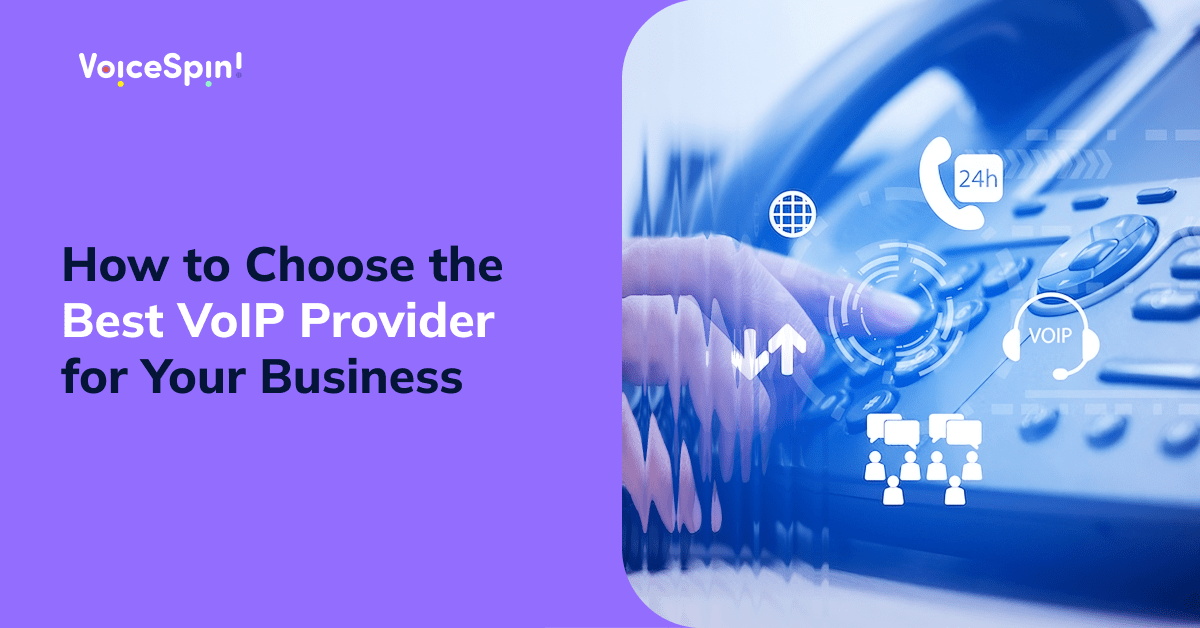



 +18889082995
+18889082995
 +442036084160
+442036084160
 +97237237006
+97237237006